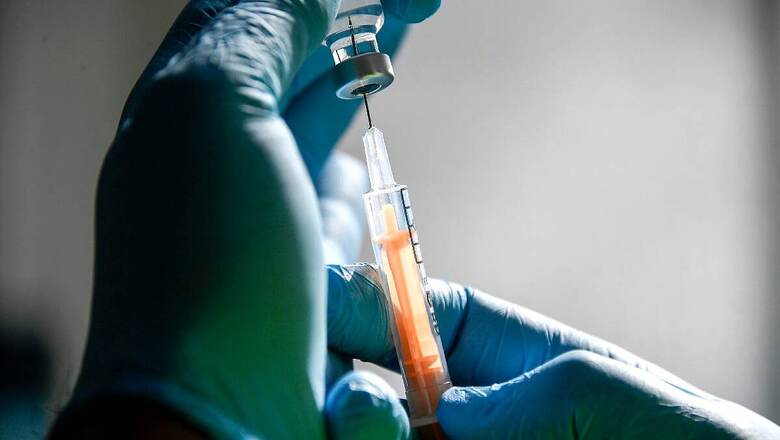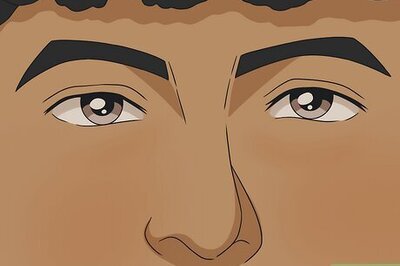
views
India’s Covid-19 vaccination efforts are seemingly set to embrace Aadhaar-based facial recognition, a move that officials say would do away with the need for biometric fingerprint or iris scan machines at inoculation centres and make the process contactless in order to minimise chances of accidental infections, according to a media report.
In an interview to ThePrint, National Health Authority (NHA) head R.S. Sharma said the Unique Identification Authority of India (UIDAI) – the governing body behind the Aadhaar project – had begun a pilot project to test facial recognition algorithms based on facial data obtained from the Aadhaar database.
Sharma, the chairperson of an empowered committee on Covid vaccination and a former mission director of UIDAI, called the pilot “successful”, and stressed that the process will be key to making the entire Covid-19 vaccination drive in India “contactless”.
How face recognition would work
The Covid-19 vaccination drive presently requires biometric authentication based on fingerprints or retinal scans, Sharma told ThePrint. Such authentication procedures require contact. But facial recognitions will help alleviate concerns of accidental infections at vaccination centres by making the process contactless. For the process to work, eligible citizens will be required to register for the Covid-19 vaccination setup via the Co-WIN platform on Aarogya Setu app.
During registrations, users can link their mobile numbers and use Aadhaar numbers as their identification. Once at a vaccination booth, users who have chosen to authenticate their identity by using Aadhaar details will have themselves automatically verified with the help of the facial recognition system. Sharma claimed the UIDAI facial recognition algorithms to be the “best”, adding that the infrastructure was capable of taking into account facial changes that happen to individuals over almost a decade – and still authenticate successfully.
Benefits of the process
The clear benefit in using facial recognition in the vaccination drive would be to establish even fewer contact points between individuals in this whole circuit. Direct personal contact has been the biggest reason behind Covid-19 spread across the world, and the use of facial recognition by cameras placed at a distance eliminates the need for citizens touching the same fingerprint authenticator, one after the other.
The central government will also issue Indian citizens a digital Covid-19 vaccination certificate, which will be in line with the international Fast Healthcare Interoperability Resources standard. The latter is an international benchmark of sorts for homologating healthcare documents and make them easier to access anywhere in the world. Given that this digital certificate will be linked to an individual’s personal identification, the general argument states that usage of data already with the government in the UIDAI Aadhaar database cannot do any harm. Instead, it would only make the process simpler and more streamlined, and may even speed up the vaccination drive for individuals.
Concerns around surveillance and data security
In reaction to the NHA’s move announcing the facial recognition pilot project in Jharkhand’s Covid-19 vaccination centres, several individuals questioned the need to bring in facial surveillance, and if establishing such an additional level of infrastructure would really make any tangible difference to the efficacy of the entire process. More users called for adopting steps to “decentralise” the vaccination process, while others demanded that data security credentials be established before the collection of vital surveillance data.
Earlier, Ashwini Kumar Choubey, the Union Minister of State for Health and Family Welfare, had stated that individuals will not be required to furbish or link their Aadhaar details to get a shot of the vaccine. This statement from two months ago goes against NHA chief Sharma’s latest announcement to roll out Aadhaar-based facial recognition, which he claims will be done across the country as soon as UIDAI crosses 50,000 or 60,000 facial recognitions in its pilot ventures.
The announcement harks back to the privacy and data collection controversies that were raised during the rollout of Aarogya Setu in the initial phases of Covid-19 pan-India lockdown in 2020. Back then, in an interview with News18, Sidharth Deb, parliamentary and policy counsel at the Internet Freedom Foundation of India (IFF), labelled Aarogya Setu as a service that offered “sub-optimal transparency”, and also added that the app “does not operate under a valid legal framework that would satisfy requirements of necessity and proportionality”.
Going forward, it remains to be seen how the central government manages to address such concerns around data security, public surveillance and the effectiveness of adding a layer of technological infrastructure in terms of cost and resources. Until then, UIDAI will soon be looking to green-light the move for establishing facial recognition as a valid way to authenticate Covid-19 vaccination efforts at an individual level – as soon as its pilot project reaches its goals.
Read all the Latest News, Breaking News and Coronavirus News here. Follow us on Facebook, Twitter and Telegram.



















Comments
0 comment